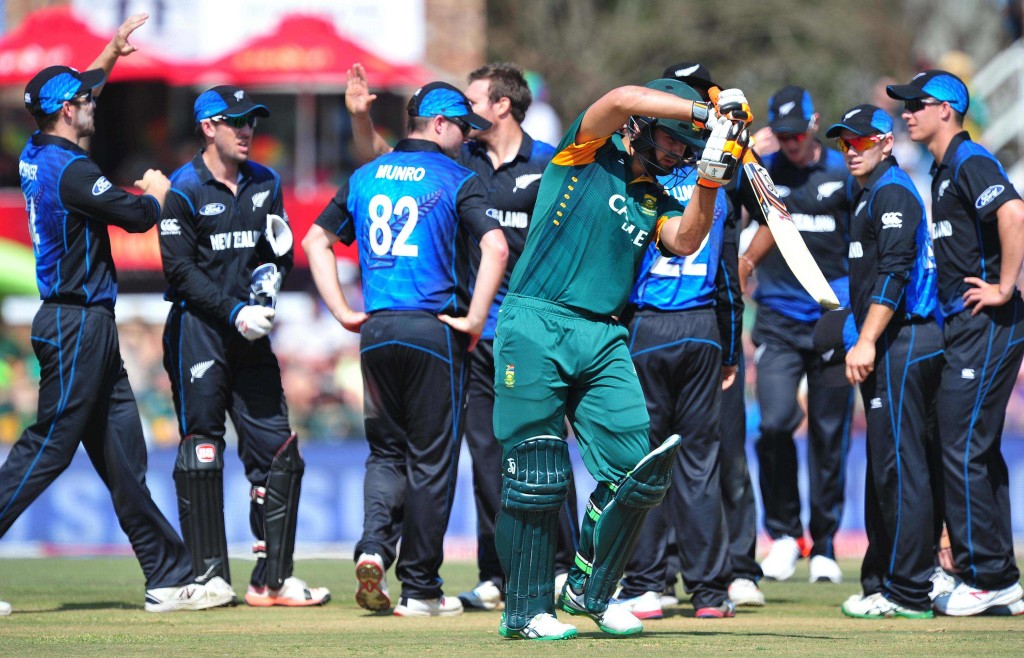Exactly five months ago South Africa lost their World Cup semi-final to New Zealand. They haven’t progressed since.
In fact, the Proteas have gone backwards as a limited-overs unit.
The playing personnel is largely the same. Quinton de Kock (dropped from the squad and told to regain form with the ‘A’ side, which he did), Faf du Plessis (injured), JP Duminy and Morne Morkel (both on paternity leave) are absent from the XI that went down narrowly in Auckland, but seven members remain.
But against a severely-weakened New Zealand, with only four players from that XI which beat South Africa in the semi-final – the Proteas have looked ordinary, and that’s on home soil as well. This comes after losing an ODI series to Bangladesh for the first time. Not that South Africa simply lost: they were beaten by seven and nine wickets in their last two matches and against New Zealand in Potchefstroom they were trounced by eight wickets.
Those aren’t close margins of defeat, they are hidings in anyone’s language.
Kagiso Rabada has been the only positive the Proteas can pluck from the wreckage of three ODI defeats in their last five matches since the World Cup and whatever the outcome of the series decider in Durban on Wednesday, the cracks won’t be glossed over with a big victory, especially over what is a New Zealand side shorn of players like Brendon McCullum, Trent Boult, Tim Southee, Corey Anderson and Ross Taylor. It’s a severely watered-down Kiwi side playing South Africa in their own backyard.
However, more disappointing than the string of poor results and regression since the World Cup has been the manner of the defeats and performances.
Captain AB de Villiers spoke after the first match, won incidentally by the Proteas. ‘I didn’t think we had a really good night with the ball in hand, I found our energy lacking in the field. That probably just comes with a bit of time together with a couple of new faces that need to get used to the way I captain and the way we operate as a team. I don’t know exactly what went wrong, but I didn’t feel that energy that we normally have from the guys.’
A couple of days later the situation was replicated in Potchefstroom. There was a lack of patience with the bat from all who got starts with the exception of Farhaan Behardien, who batted well for his 70 on a slow batting surface that demanded respect against bowlers who bowled wicket to wicket.
Poor catching – again – with Aaron Phangiso, Imran Tahir and David Wiese dropping catches, and a general lethargy in the field. In fact, for me the whole ‘lack of fire’, as De Villiers mentioned after the first ODI, was summed up at the end of the New Zealand innings in Potchefstroom.
With 23 runs required to win and 60 balls remaining, Dale Steyn – who looked to jar his shoulder – was taken out of the attack – and the ball thrown to Rilee Rossouw. The next over, De Villiers himself took the ball and the two recognised batsmen sent down the last 27 balls between them, as they helped Martin Guptill get to his hundred. In fact, the last ball was a loopy fully toss outside off stump and Guptill simply had to hit it through cover to the boundary for four and celebrate his century.
Since when in international cricket is a player ‘given’ a hundred and even if it was inevitable surely there should be some sense of fight from the bowling and fielding side?
I would like to highlight a quote from De Villiers. ‘It’s a disappointing loss that once again we seem to not get enough partnerships in pressure situations. We’ve done it in the past, but unfortunately we couldn’t do that, so a very disappointing loss. I felt that [they] wanted it more than us. It’s just a matter of urgency and being prepared to fight it out. They bowled pretty well. They were geared up and really wanted to win the game. You could see that from a mile away. I tried to get the boys going before the game. Didn’t feel like we had enough energy, and I guess that showed with the batting and just not prepared to fight it out. And it’s very disappointing.’
No, that wasn’t a soundbite from the defeat to New Zealand in Potchefstroom on Sunday. Disturbingly, it was over five months ago, in March, after being beaten by Pakistan at the World Cup. And again, the common thread is ‘lack of energy’ and ‘not prepared to fight it out’, while lamenting the lack of batting partnerships.
The issue of ‘SMS-gate’ before the World Cup final has never been satisfactorily explained or addressed and that was said to be a factor before losing to New Zealand at that tournament. Since then however, the Proteas have looked a pale shadow of the team that went into the World Cup as one of the strong favourites.
For players and coaching staff to stand up before the media and say ‘everything is brilliant, team spirit is high, we’re in a good space, we’ll bounce back’ is all well and good and straight from the in-house manual. However, the body language and subsequent results betrays those clichés. What is going on that we don’t know about?







